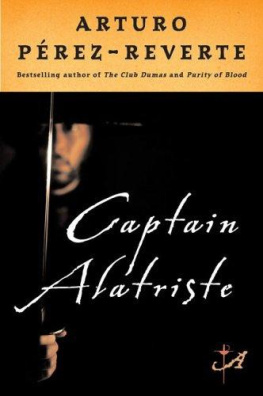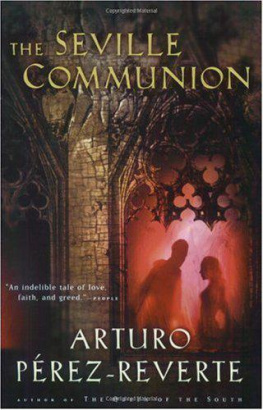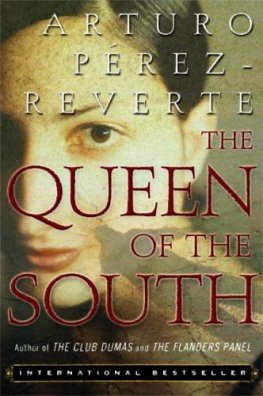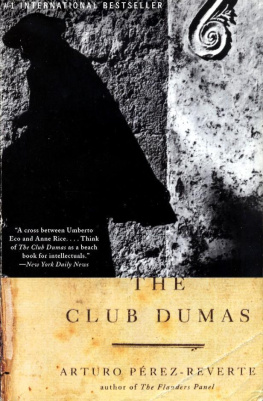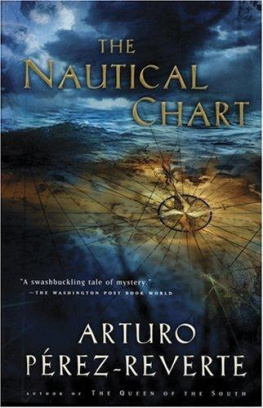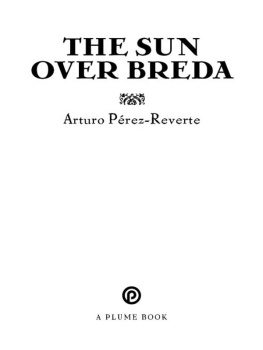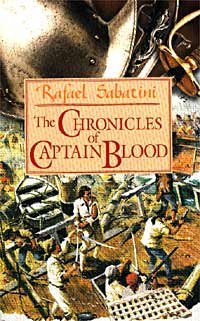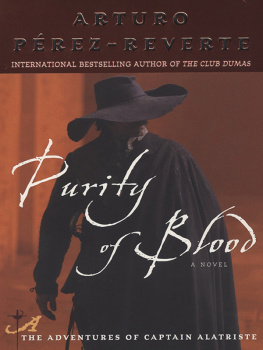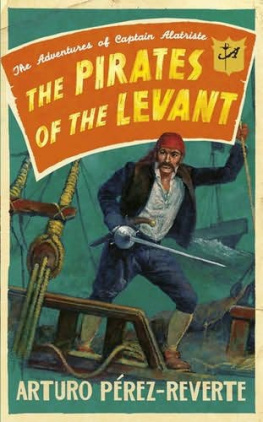'A thinking man's adve nture novel, where sword fights and tales of derring-d o are interwoven with wonderful passages of poetry and gems of historical and cultural information'
Guy Florita, The Times
'Our hero is an ex-soldier [who] has a certain fatalistic melancholy, as well as a voracious reading habit. Wolfish grey eyes, battle scars, a warrior's code of honour and irreproachable gallantry complete the outfit... Perez-Reverte is a huge admirer of Alexandre Dumas; here, like his hero, he has produced a very high-class entertainment'
Steven Poole, Guardian
'Perez-Reverte is very good at evoking the atmosphere of a teeming, corrupt and jaded Madrid, unhappily enduring the reign of Philip the Fourth in the last decades of Spain's imperial glory. He is superb at the precisely choreographed sword fights'
Toby Clements, Daily Telegraph
'Arturo Perez-Rever te has streamlined his prose to rapier point and stri kes home with a dark and moving w ork. This is as gripping as any swashbuckler, with Spain's Golden Age tel lingly resurrected, but it is a more sobering tal e of honour, responsibility and political machinatio n. Captain Alatriste's powerful personality fairly radiates from the page. Highly recommended' Library Journal
'A pleasure of swash, buckle and atmosphere, along with tidy infomercials on topics such as the poetry, theater and the traditions of the day'
Kirkus Reviews
'Equipped with a qui ck-witted, charismatic hero and much to provoke and goad him, Mr Perez-Reverte has the makings of a fl amboyantly entertaining series. Captain Alatriste ends with a wicked flourish, an evil laugh and a strong likelihood that the best is yet to come' New York Times
'From the 19th century on, readers searching for adventure have always loved tales of flashing steel, of duels to the death on moonlit parapets, of swashbucklers with ironic smiles and perfect manners... Arturo Perez-Reverte now adds Captain Alatriste' Washington Post
'Splendidly paced and filled with a breathtaking but not overwhelming sense of the history and spirit of the age, this is popular entertainment at its best: the characters have weight and depth, the dialogue illuminates the action as it furthers the story and the film-worthy plot is believable throughout'
Publishers Weekly
'Perez-Reverte's moody, wounded semi-hero ... is a whole-cloth invention out of 17th-century Madrid that has led to a 21st-century literary phenomenon ... introduces a charismatic, complicated leading man the clash and dash ar e thrilling; the swordplay is a bonus'
Entertainment Weekly
'From first word to last, this novel, sure to be a hit, fairly drips adventure off the page' Booklist
Arturo Perez-Reverte lives near Madrid. Originally a war correspondent, he now writes fiction full time. In 2003 he was elected to the Spanish Royal Academy. His website can be visited at
.
By Arturo Perez-Reverte
Purity of Blood Captain Alatriste The Queen of the South The Nautical Chart The Fencing Master The Seville Communion The Club Dumas The Flanders Panel
CAPTAIN ALATRISTE
ARTURO PEREZ-REVERTE
Translated from the Spanish by Margaret Sayers Peden
A PHOENIX PAPERBACK
First published in Great Britain in 2005
by Weidenfeld & Nicolson This paperback edition published in 2006 by Phoenix, an imprint of Orion Books Ltd, Orion House, 5 Upper St Martin's Lane, London WC2H 9EA
13579 8642
Copyright 1996 by Arturo Perez-Reverte English translation copyright 2005 by Margaret Sayers Peden Copyright Published by arrangement with Alatriste S.L.
The right of Arturo Perez-Reverte to be identified as the author of this work has been asserted by him in accordance with the Copyright, Designs and Patents Act 1988.
All rights reserved. No part of this publication may be reproduced, stored in a retrieval system, or transmitted, in any form or by any means, electronic, mechanical, photocopying, recording or otherwise, without the prior permission of the copyright owner.
A CIP catalogue record for this book is available from the British Library.
ISBN-13 978-0-7538-2087-2 ISBN-10 0-7538-2087-0
Printed and bound in Great Britain by Clays Ltd, St Ives pic
The Orion Publishing Group's policy is to use papers that are natural, renewable and recyclable products and made from wood grown in sustainable forests. The logging and manufacturing processes are expected to conform to the environmental regulations of the country of origin.
For our grandparents Sebastian, Amelia, Pepe, and Cala: for life, books and memories
Was once a captain
The story goes
Who led men in battle
Though in death's throes
Oh, sen ores! What an apt man
was that brave captain!
E. MARQUINA The Sun Has Set in Flanders
CAPTAIN ALATRISTE
I. THE TAVERN OF THE TURK
He was not the most honest or pious of men, but he was courageous. His name was Diego Alatriste y Tenorio, and he had fought in the ranks during the Flemish wars. When I met him he was barely making ends meet in Madrid, hiring himself out for four maravedis in employ of little glory, often as a swordsman for those who had neither the skill nor the daring to settle their own quarrels. You know the sort I mean: a cuckolded husband here, outstanding gambling debts there, a petty lawsuit or questionable inheritance, and more troubles of that kind. It is easy to criticize now, but in those days the capital of all the Spains was a place where a man had to fight for his life on a street corner lighted by the gleam of two blades.
In all this Diego Alatriste played his part with panache. He showed great skill wh en swords were drawn, even more when with left-handed cunning he wielded the long, narrow dagger some call the vizcaina, a weapon from Biscay that professionals often used to help their cause along. If a knife will not do it, the vizcaina will, was the old saying. The adversary would be concentrating on attacking and parrying, and suddenly, quick as lightning, with one upward slash, his gut would be slit, so fast he would not have time to ask for confession. Oh yes, Your Mercies, those were indeed harsh times.
Captain Alatriste, as I was saying, lived by his sword. Until I came into the picture, that "Captain" was more an honorary title than a true rank. His nickname originated one night when, serving as a soldier in the king's wars, he had to cross an icy river with twenty-nine companions and a true captain. Imagine, Viva Espana and all that, with his sword clenched between his teeth, and in his shirtsleeves to blend into the snow, all to surprise a Hollandish contingent. They were the enemy at the time because they were fighting for independence. In fact, they did win it in the end, but meanwhile we gave them a merry chase.
Getting back to the captainthe plan was to stay there on the riverbank, or dike, or whatever the devil it was, until dawn, when the troops of our lord and king would launch an attack and join them. To make a long story short, the heretics were duly dispatched without time for a last word.
They were sleeping like marmots when our men emerged from the icy water, nearly frozen, shaking off the cold by speeding heretics to Hell, or wherever it is those accursed Lutherans go. What went wrong is that the dawn came, and the morning passed, and the expected Spanish attack did not materialize. A matter, they told later, of old jealousies among the generals and officers in the field. Fact is, thirty-one men were abandoned to their fate, amid curses and vows, surrounded by Low Dutch disposed to avenge the slashed throats of their comrades. With less chance than the Invincible Armada of the good King Philip the Second.
It was a long and very hard day. And in order that Your Mercies may picture what happened, only two of the Spanish made it back to the other bank of the river by the time night fell. Diego Alatriste was one of them, and as all day long he had commanded the troopsthe authentic captain having been rendered hors de combat in the first skirmish with two handspans of steel protruding from his backthe title fell to him, though he had no opportunity to enjoy the honor. Captain-for-a-day of troops fated to die, and paying their way to Hell at the cost of their hides, one after another, with the river to their backs and blaspheming in good Castilian Spanish. But that is the way of war and the maelstrom. That is the way it goes with Spain.

